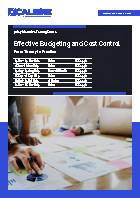| Date | Venue | Fee | |
|---|---|---|---|
| 15 Jun - 19 Jun 2026 | Dubai – UAE | $ 5,950 | Register Now |
| 24 Aug - 28 Aug 2026 | Sharm El Sheikh - Egypt | $ 5,950 | Register Now |
| 07 Sep - 11 Sep 2026 | Dubai – UAE | $ 5,950 | Register Now |
| 19 Oct - 23 Oct 2026 | Al Khobar - KSA | $ 5,950 | Register Now |
| 23 Nov - 27 Nov 2026 | Dubai – UAE | $ 5,950 | Register Now |
About the Course
Understanding and interpreting financial information are essential at every level of business. The full scope of financial data and reporting is supported by a foundation of the vital aspects of theory and practical methods and techniques.
Budgeting falls under the broader managerial accounting umbrella. It is focused on short-term forecasts, often based on engineering techniques. However, the models and approaches are not standardised, and no guidelines are provided by the accounting standards (as opposed to the financial accounting process). It is challenging as it should be adapted to different types of business and conditions; its methods are also applicable to single projects.
Cost Control is a system of accounting disclosures and operational interventions to define the business areas to which it is possible to reduce the number of costs in compliance with the previously programmed qualitative, quantitative and temporal objectives. Cost control is also essential to audit professionals and company managers. It helps improve the performances by analysing variances and the efficiency of the operations. Hence, cost control complements budgeting analysis, reinforcing the assumptions or identifying eventually misleading conclusions.
Therefore, this Effective Budgeting and Cost Control training course focus on modelling budgets with innovative approaches. Practical exercises will be performed during the training, and the delegates will be able to master the art of budgeting from scratch at different levels.
Core Objectives
The delegates will achieve the following objectives:
- Understand budgeting and its contextualisation within the accounting process
- Apply the essential budgeting models in the context of a real working environment
- Assess financial information, particularly when reviewing other companies’ financial data
- Interpret information presented in financial reports
- Enhance decision-making skills in financial matters
Training Approach
The blended methodology includes the lectures focused on essential theories rooted in the accounting equation and budgeting models. Practical examples will also be provided and integrated with real-time exercises. The delegates will be provided PDFs of relevant books and scholarly articles, worksheets, and flexible budgeting techniques.
The delegates will have the knowledge and skills to perform their tasks successfully. This training course adopts strategies and methodologies suitable for upskilling and reskilling. Consistent and logical steps are followed to ensure complete understanding and application of the intended topics. All studied topics are carefully selected to ensure they improving organisational performance.
The Attendees
Likewise, it will be valuable to the professionals but not limited to the following:
- Accounting and Finance Professionals
- Procurement Management
- Accounts Payable Manager
- Accounts Payable Staff and Professionals
- Clerks and Specialists who wish to advance their career
- Whoever works closely with accounts payable
Daily Discussion
DAY ONE: UNDERSTANDING DIFFERENT TYPES OF FINANCIAL INFORMATION
- Financial Accounting, Managerial Accounting and Finance
- Accounting Process and Decision Making
- Different Types of Costs
- The Role of Budgeting within the Organisations
- Models and Techniques
DAY TWO: THE CASH CYCLE
- Accrual and Cash Basis
- The Cash Cycle and its Management
- Customers & Suppliers: The Collection and Payment Processes
- Basic Cash Flow Statements
- Budget Benchmarking
DAY THREE: INVENTORY AND FIXED ASSETS
- Inventory Management
- Different Methods of Valuation
- Break-even Analysis and Contribution Margin
- Assets and Depreciation
- Fungible and Non-fungible Assets
DAY FOUR: ACCOUNTING CYCLE
- Statement of Profit and Losses
- Profitability Ratio Analysis
- Statement of Financial Position
- Liquidity and Structure Ratio Analysis
- Trends and Comparative Ratio Analyses
DAY FIVE: BUDGETING METHODS
- Full Costing
- Activity Based Costing
- Direct Costing
- Flexible Budgets
- Comparative Analyses
Certificate Awarded
Upon successful completion of this training course, participants will be awarded a Certificate of Completion from XCalibre Training Centre, acknowledging their accomplishment. This certificate serves as a testament to their dedication to developing their skills and advancing their expertise in their respective fields.



